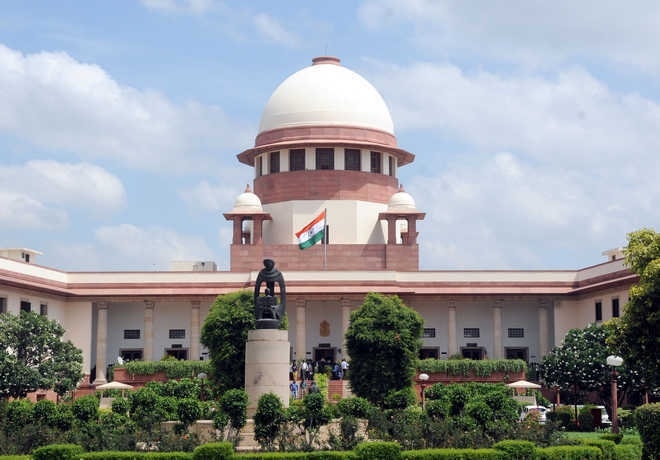SC ON BAIL IN NDPS CASES
| Date :03-Apr-2023 |

By ADV. R. S. AGRAWAL :
A plain and literal interpretation of the conditions under section 37 (that Court should be satisfied that the accused is not guilty and would not commit any offence) would effectively exclude grant of bail altogether, resulting in punitive detention and unsanctioned preventive detention as well.

A CCORDING to the Supreme Court’s judgement in the case –Mohd Muslim alias Hussain v. State (NCT of Delhi), delivered on March 28, 2023, Justice S. Ravindra Bhat and Justice Dipankar Datta have, keeping in mind various possible ill-effects of almost always refusing bail in the offences under the Narcotic Drugs and Psychotropic Substances (NDPS) Act, 1985 due to very stringent provisions, underlined the need for the Courts to be sensitive to these aspects (because in the event of an acquittal, the loss to the accused is irreparable), and ensure that trials –especially in cases, where special laws enact stringent provisions, are taken up and concluded speedily. A plain and literal interpretation of the conditions under section 37 (that Court should be satisfied that the accused is not guilty and would not commit any offence) would effectively exclude grant of bail altogether, resulting in punitive detention and unsanctioned preventive detention as well. Therefore, the only manner in which such special conditions as enacted under Section 37 can be considered within constitutional parameters is where the court is reasonably satisfied on a prima facie look at the material on record (Whenever the bail application is made) that the accused is not guilty. Any other interpretation would result in complete denial of the bail to a person accused of offences such as those enacted under section 37 of the NDPS Act.
The standard to be considered, therefore, is one, where the court would look at the material in a broad manner, and reasonably see whether the accused’s guilt may be proved. The judgements of this Court have, therefore, emphasized that the satisfaction which courts are expected to record, that is, that the accused may not be guilty, is only prima facie based on a reasonable reading, which does not call for meticulous examination of the materials collected during investigation (as held in Union of India v. Rattan Malik – (2009) 2 SCC 624).Grant of bail on ground of undue delay in trial, cannot be said to be fettered by section 37 of the Act, given the imperative of section 436A, which is applicable to offences under the NDPS Act too. Having regard to these factors, the court is of the opinion that in the facts of this case, the appellant deserves to be enlarged on bail.
It would be important to reflect that laws which impose stringent conditions for grant of bail, may be necessary in public interest; yet if trials are not concluded in time, the injustice wrecked on the individual is immeasurable. Jails are overcrowded and their living conditions, more often than not, appalling. According to the Union Home Ministry’s response to Parliament, the National Crime Records Bureau had recorded that as on December 31, 2021, over 5,54,034 prisoners were lodged in jails against total capacity of 4,25,069 in the country. Of these 1, 22, 852 were convicts; the rest 4,27,165 were undertrials. The danger of imprisonment, is that inmates are at risk of “prisonisation”, a term described by the Kerala High Court in the judgment of the case- A convict Prisoner v. State – 1993 Cr.L.J. 3242 as “a radical transformation” whereby the prisoner:“loses his identity. He is known by a number. He loses personal possessions. He has no personal relationships. Psychological problems result from loss of freedom, status, possessions, dignity and autonomy of personal life.
The inmate culture of prison turns out to be dreadful. The prisoner becomes hostile by ordinary standards. Self-perception changes.”There is a further danger of the prisoner turning to crime, “as crime not only turns admirable, but more professional the crime, more honour is paid to the criminal.” The Supreme Court has reminded that long back, in the decision of the case – Hussainara Khatoon v. Home Secretary, State of Bihar-(1980) 1 SCC 81; SC had declared that the right to speedy trial of offenders facing criminal charges is ‘implicit in the broad sweep and content of Article 21 as interpreted by this Court”. Remarking that a valid procedure under Article 21 is one which contains a procedure that is “reasonable, fair and just”, it was stated that no procedure which does not ensure speedy trial for determination of the guilt of such person can be regarded as ‘reasonable, fair and jut and it would fall foul of Article 21. These observations have resonated, time and again, in several judgmentssuch as Kadra Pahadiya & others v. stateof Bihar – (1981) 3 SCC 671 and Abdul Rehman Antulay v. R. S. Nayak – (1992)1 SCC 225; in the latter, the Court reemphasised the right to speedy trial, andfurther held that an accused, facing prolonged trial, has no option. These issues have pivotal meaning tofacts of this case.
The appellant’sgrievance had been that his applicationfor bail ought not to have been rejected by the High Court, in the present case, considering that he has suffered incarceration for over seven years and thecriminal trial has hardly reached halfway mark. The appellant has been accused of committing offences punishable undersections 20, 25 and 29 of the NDPS Act. His application under section 439 readwith section 482 of the CrPC, seekinggrant of regular bail, before the Delhi HC, was denied by the impugned judgment. At the time of arrest, the appellant was 23 years of age. He was also notfound in possession of the narcotic drug; though other accused were. The prosecution’s case allegedly wasthat on September 28, 2015, based onsecret information received by the Police, a raid was conducted, leading to arrest of 4 accused. The appellant’s bail application was rejected by the sessions Court based on the gravity of the offencesalleged, severity of punishment and theappellant’s alleged role. It was notedthat he had been in regular contact withthe other co-accused to commit thecrime, and that the material witnesseshave not been examined yet. On approaching the HC, it held thatthere was a prima facie case against himand no grounds to rely on the exceptions of section 37 of the NDPS Act. Therefore, he was refused regular bail and had to move the Supreme Court. Incarceration has further deleteriouseffects- where the accused, if belonging to the weakest economic strata, suffers immediate loss of livelihood, andin several cases, scattering of familiesas well as loss of family bonds and alienation from society. In result, the SupremeCourt has allowed the appeal and directed that the appellant be enlarged on bail subject to conditions as the trial court may impose.
